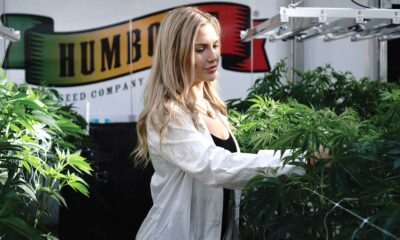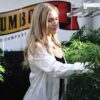
Culture
Roots and Seeds: The Many Roads That Lead to Cannabis
There’s more than one life path that leads to a career in the blossoming cannabis industry, and understanding the path others took can help you carve out your own.
A career in cannabis used to be something that sort of happened to you — the accumulation of a lifetime spent making certain personal decisions and connections; the consequence of catching (and just as often) missing certain breaks in life; the potent hybrid of a Scarlet Letter and the Midas Touch.
It isn’t that cannabis wasn’t lucrative during prohibition, it’s that in purely economic terms, nobody got involved with the plant during prohibition on purely economic terms: we didn’t chose a career in cannabis, we chose a life with cannabis in it.
But in the immortal words of Dr. Hunter S. Thompson, “When the going gets weird, the weird go pro.” Sometime between the failure of Prop. 19 and the passage of Prop. 64, I looked at the changing landscape of cannabis journalism and realized the going had gotten plenty weird. Then I took a hard look at myself and put two and two together: I’d already bought the ticket — it was time to take the ride.
I’ve had the chance to interview hundreds of cannabis professionals and ask thousands of questions. The one that always inspires the most revealing answer about a person’s character and worldview only has two words — why cannabis?
There are as many unique answers to this question as there are different life paths that lead to a career in cannabis.

When Life Hands You Bacon…
I first met Brandon Mondo at the now defunct “Synagogue Sesh” in San Leandro, California, which ultimately transformed into the “Dank Tank” sesh; a weekly gathering of stoners, wooks and dabbed-out Oakland denizens of all denominations that’s basically the Mos Eisley Cantina of the East Bay sesh scene — I’m a sucker for scum and villainy, so I attend every chance I get.
Mondo is still a regular fixture of the event, and on those occasions when he doesn’t make it, his absence is felt in bacon — ultra high-dose, cannabutter-infused candied bacon.
Mondo has remained true to his roots by continuing to supply old friends at the Dank Tank, but his business and branding have continued to grow upward and outward. He’s recently rebranded his company from “Mondo” to “Wonk0” and upped his marketing and packaging game substantially with the help of a new infusion of capital from his new partners. The company is securing two commercial kitchens and he says Wonk0 products will hit the dispensaries in about six months.
Right now he’s enjoying success, but his path to it began with suffering.
In 2012, Mondo suffered an injury to his back that changed the course of his life.
“I was in agony. I was immobilized, I wasn’t walking, I was having serious nerve problems,” he said. “For about a year and a half I was just inhaling pain pills, cause the problem wasn’t being fixed. I was consuming so much cannabis that it caused a rift between my dad and I still don’t talk to him.”
Mondo says he quickly discovered the limits of inhaled cannabis medicine for his condition.
“You learn you can only smoke so much or dab so much, and then you just have to eat it,” he said, adding the pain from his injury was so severe he required ultra high-dose edibles — as high as 5,000 mg of THC per piece. “That’s just how I made edibles: I just put as much as I could to make it strong cause I knew it had to be — those were strong enough to make people hallucinate.”
Mondo used to work for Apple. His journey into cannabusiness didn’t just start where his employment with the tech icon ended: what cost him one job became his next job.
“I bounced between corporate and retail at Apple: I was one of the top performing retail employees in the company translation automation systems,” he said. “In September 2014 I gave some coworkers that had 215 cards edibles. We had them in our locker, somebody went home and ate two instead of one, Apple found out and fired six people.”
That same pronounced potency that got Mondo fired ultimately became the signature of Mondo products — something that his success has forced him to change: he’s had to dial back the potency of his Wonk0 products to 500 mg max (roughly half of a an OG Mondo product) because many dispensaries simply won’t carry anything stronger.

Planned Growth
Brandon was pushed into the deep end of the pool by life. Dylan “The Dude” Lebowski, the young grower and mastermind behind Lebowski Farms and Concentrates, did not require so much as a nudge — unless you count the run in with Maryland law enforcement that inspired him to move west.
Dylan’s journey into the industry took an increasingly familiar trajectory — from the East Coast to California, through Oaksterdam University and into the business.
“I was growing and selling herb in college until I caught a case,” he tells me. “The officer arresting me told me ‘You can’t just walk around looking like The Dude from the Big Lebowski and not think anything’s gonna happen’,” he said. “I came to the Bay Area to attend Oaksterdam and prove that cop wrong — the company name is sort of a ‘f*ck you’ to him.”
My first visit to Lebowski Farms, the then-modest cultivation facility run by Dylan Lebowski and his crew of Oaksterdam U-educated Maryland expats, treated me to a glimpse of an oversized homegrow bursting at the seams, begging to expand to a commercial space — a demand the company is now moving to meet with a 6,000 square-foot, 200-light warehouse grow currently under construction.
Lebowski has also grown personally since our first meeting — his enthusiasm is tempered with a serious pragmatism about the shifting sands of cannabusiness in California. Like many 215 vendors, when it comes to the possibility of moving from a medical provider to an adult use supplier, he has philosophical misgivings — but also some serious economic concerns.
“Is big business gonna swallow up? It’s very possible in the recreational field, which is another reason I want to stay medical,” he said. “Because our business was established before sept first of last year, so we’re supposed to be prioritized for the recreational permit… I think I’m leaning against as the president of the company — my vote might be to stay medical. But if we do go rec it should be an easier path for us.”
The Dude isn’t thrilled about all of the scheduled and potential changes to his industry, but he speaks with the measured positivity of a long-term optimist when he looks to the future of California cannabis and his own company’s place in it.
“We’ve done everything we can to be legal, so it’s just the application process — once the applications are created: our county doesn’t even have those set up yet,” he said. “If you’re not in a city like Oakland or LA that has already said, ‘These are the policies,’ you really don’t know what to expect… people don’t know what hoops to jump through, or don’t want to, but then some of the hoops haven’t even been created yet.”

Terp Teacher
Luna Stower used to be a school teacher, and it still carries over into everything about her demeanor; her seemingly-bottomless patience; the implicitly forgiving and nurturing warmth of her ever-ready smile; the way she deliberately focuses her attention and energy on the person she’s trying to help — and she’s always helping somebody: Luna is a teacher with the heart of a healer.
To this day, when she speaks about the cannabis community and industry — the two worlds she glides through effortlessly — she uses the language and ideas of teaching, citing revolutionary educator, Paulo Freire, as she discusses her job.
“It’s like Freire and the Pedagogy of the Oppressed: the student isn’t an empty vessel to be filled, they have knowledge to share with us too,” she says. “We teach and help each other.”
And for her, that means helping others learn about the healing powers of cannabis, while learning new ways to share the same message through her interactions with patients.
Stower found her career in cannabis when she needed its healing most. She suffers from a nerve disorder that leaves her in debilitating pain when it isn’t controlled. It was during an extended sick leave because of her condition that she discovered Jetty Extracts, the concentrate company she now reps for.
Today she’s at the patient lounge at Magnolia Oakland, doing product demos for Jetty. Her eyes light up as she explains the range of products available and what conditions they can alleviate to a woman asking about arthritis . She says at the root of it all, what she does now isn’t much different from what she did in the classroom.
“A lesson plan is a lesson plan: how can I take this information, make it as concise as possible and then repeat it twelve, twenty times in a day to different people with different attention spans and levels of understanding,” she says. “That’s still what I’m doing.”
Planting Seeds
When it comes to advice for those getting into cannabis this late in the game, Lebowski said he has two main suggestions; take some classes and get fluent with social networking.
“I seriously recommend a cannabis-driven school like Oaskterdam U or Cloverleaf, I seriously recommend that if you want to get into this industry. The connections you can make at these schools are just endless,” he said. “And become tech savvy — get on Instagram, find the people who are doing it right and learn how to really navigate those social networks, cause I don’t think the Instagram thing is going anywhere — nobody calls their drug dealer anymore; they’re on IG.”
Mondo says the key is having the right people on your team, which means knowing where your expertise ends and theirs starts.
“If you’re not an expert grower, find someone who is and do what you’re good at,” he said. “Vertical integration is great, but it isn’t everything.”
For Stower, it all boils down to loving what you do — and who you do it for.
“This is for the cannabis community,” she said. “That’s not the same thing as the cannabis industry — it’s important to remember that.”
TELL US, do you work in cannabis?


























